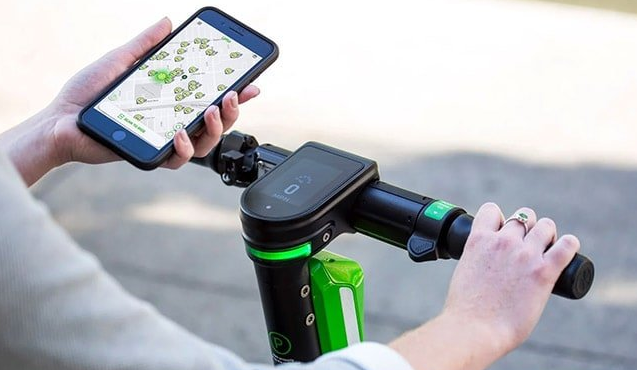E-Scooters - an eco-saviour or a speeding menace?

With MPs recently urging the government to legalise electric scooters to help reduce the congestion in major UK cities, it’s important to start thinking about whether or not they’re a safe and environmentally friendly alternative to your standard commute. Although they’re not for everyone, a lot of commuters already prefer the idea of being able to get to and from their destination using an e-scooter as it’s not only environmentally-friendly, but it’s much cheaper than the alternative options, and smaller than a bike. Not only this, but if the e-scooter giant Bird expands their range of scooters that are currently being used at the Olympic Park, across London, then being able to grab a scooter for a few minutes, and leave it outside the office for someone else to use, could be a very probable future in the coming years.
While they’re a great tool when it comes to getting around, it’s also important to look at both sides of the story. From the danger they cause to pedestrians, to the rules and regulations that are in place in countries that have legalised electric scooters, will e-scooters be an eco-saviour, or a speeding menace?
What Are Electric Scooters?
First of all, let’s look at what an electric scooter is. To put it simply, they are scooters that are similar to two-wheeled manual scooters, however, they are propelled by a motor. Over the past few years they have become increasingly popular in cities as they provide practical, environmentally-friendly and cost-effective modes of transport.
How Are Considered They Eco-Friendly?
There are lots of ways in which electric scooters are environmentally-friendly, which has become part of the main appeal. Not only do they have less impact on the environment than a car or public transport, but they’re also using absolutely no fuel at all. While the production and processes in which they are made are not guaranteed to be eco-friendly, it’s definitely a step in the right direction if you’re looking to improve the effect you have on the planet.
However, this doesn't necessarily mean they're good for the enviroment, as although the scooters themselves may not produce carbon emissions, the process of manufacturing, delivering and picking up the publically shared electric scooters from locations scattered around the city, recharging them, and dropping them back off to be used again the following day, certainly isn't carbon emission free. The Verge go into more depth on this issue in their article 'Electric scooters aren't quite as climate-friendly as we thought', where they highlight these issues.

Who Should They Be Used By?
If you’re thinking of getting an electric scooter but you’re unsure whether or not it’s going to be right for you, they are designed to help support those that are looking for a budget-friendly way to reduce the impact they have on the environment. Whether you’re commuting to and from work or you need a better way to get to school, it’s definitely worth considering if you need an alternative mode of transport.
Will There Be Rules And Regulations?
Although it may seem like using an electric scooter is the easy option, there are actually lots of rules and regulations that you will need to adhere to. To help, we’ve outlined a couple of key rules to help ensure you’re being as safe as you possibly can be below.
- Maximum Speed Limits - when using an electric scooter to get from A to B, you’re going to have to be sure you’re aware of the speed limits in the area that you’re in. Although they typically won’t pick up a lot of speed, there are going to be limitations to how fast you’re allowed to go in certain areas. It’s also important to note that there may be a time where it is dangerous to go at a slow space.
- Scooters Need Number Plates - another important thing to consider is that your scooter is going to require a number plate. While this may not have been your first thought, it’s something you’re going to have to arrange before you can officially get it on the road. With this in mind, it’s worth questioning whether E-scooters will also be able to display personalised registration plates?
What Issues Could They Cause?
- A Danger To Tourists - one of the biggest concerns when it comes to using e-scooters in a busy city is that they’re going to be a danger to others. Although COVID-19 is reducing the number of tourists that are currently on the road, chances are cities are going to start picking up when it comes to visitor numbers soon. With lots of tourists and electric scooters on the streets, it’s’ going to be hard to navigate.
- A Danger To Pedestrians And The Disabled - on a similar note, pedestrians are going to find it incredibly difficult to get around if there is an increase in people using electric scooters. More importantly, it’s going to be harder for disabled people who need space in order to ger around.
- More Injuries Could Be A Strain On The NHS - electric scooters are safe to ride, however, they have been known to cause road traffic accidents in busy areas. With more and more scooters on the roads and paths, chances are there are going to be a lot more injuries as a result. With an increase in injuries, there’s also a chance it could be a strain on the NHS during this already difficult time.
- Not Enough Space - finally, there’s already minimal space to social distance and with more scooters during peak travel hours, space will get increasingly smaller.

With lots of important points to discuss when it comes to e-scooters, you have everything you need to decide whether or not they’re the right option for you when it comes to environmentally friendly travel. What else do you need to consider? Did we miss anything off of the list? Let us know your thoughts and ideas over on our Instagram - @primoreg.

















